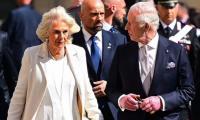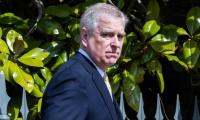KARACHI/ NEW YORK: Hours after US President Donald Trump announced a 90-day pause on reciprocal and universal tariffs, Democratic lawmakers raised the alarm over potential insider trading and market manipulation tied to his tariff policy and market-related social media posts.
Wall Street’s wild 24-hour rollercoaster has raised eyebrows across financial markets. After Trump’s surprise tariff reversal sent stocks soaring, the gains that saw retracement the next day -- fueling speculation that insiders may have traded on advance knowledge of the policy shift.
In a video message posted on X, Senator Chris Murphy warned that “an insider trading scandal is brewing”. He said that hours after Trump posted on social media (around 9:30am, ET) that it was a “good time to buy”, the Trump administration made an unexpected announcement suspending tariffs on most countries, excluding China. The market, which had been tumbling, reversed sharply, prompting questions about whether individuals close to the president profited from early knowledge of the move.
On Wednesday, Trump announced a 90-day pause on higher tariffs, saying he took the decision after more than 75 countries had reached out to negotiate and did not retaliate against the US.
“The bottom line is that the chaotic nature of this tariff policy,” Murphy added, “gives ample opportunity for any individual who has early access to information to make boatloads of money.” “This entire White House is one giant grift,” he said.
Senator Elizabeth Warren echoed the concerns, calling for an independent investigation into whether Trump or members of his administration manipulated markets for personal or political gain. In her post on X, she said: “Did Trump help insiders cash in on his tariff flip-flopping? It sure looks like corruption.”
The video accompanying the post had her delivering a speech on the Senate floor. She said, “He posted ‘THIS IS A GREAT TIME TO BUY’ in all caps -- was that market manipulation? Was it corruption in plain sight?” Warren asked, warning of widespread uncertainty for businesses and consumers amid fluctuating trade policies.
Warren also urged Congress to take immediate action, highlighting her bipartisan resolution with Senator Ron Wyden aimed at curbing Trump’s tariff authority, which she described as “worldwide and chaotic”.
In his own post, Senator Adam Schiff underscored the need for congressional oversight, questioning whether friends, advisors, or associates of Trump had traded stocks based on nonpublic information. “It is crucial to ask whether individuals personally profited from insider information while average Americans’ savings and retirement accounts were being wiped out,” Schiff said.
While the White House has not responded to the allegations, Schiff said lawmakers would press ahead with oversight efforts and demand transparency.
Earlier, US stocks skyrocketed high right after President Donald Trump’s announcement to pause the “reciprocal”, with the exception of China.
US stocks immediately surged, posting a historic rally. The Dow skyrocketed 2,963 points, or 7.87 percent. The S&P 500 shot up 9.52 percent. The tech-heavy Nasdaq soared 12.16 percent.
In a massive turnaround, the S&P 500 posted its best day since October 2008. It was also the third-best day for the benchmark index since its modern-day version was formed in 1957.
The Nasdaq posted its best day since January 2001 and its second-best day in its history. The Dow posted its best day in five years. The positive shift was widespread. Nearly every single company in the S&P 500 rose, according to data from FactSet.
Amazon (AMZN) rose 11.98pc. Nike (NKE) gained 11.36pc. Meanwhile, United Airlines (UAL) soared 26.14pc, Delta Air Lines (DAL) surged 23.38pc and American Airlines (AAL) surged 22.6pc. On the Nasdaq, Apple (AAPL) surged 15.33pc. Nvidia (NVDA) rose 18.72pc. Palantir (PLTR) gained 19pc. Tesla (TSLA) surged 22.69pc. The S&P 500 went up 12.86 percent from its nadir reached two days ago. Before the upward swing, the S&P 500 had been on the precipice of bear market territory, coming close to a stunningly rapid drop of 20 percent from the all-time high it hit just seven weeks ago on February 19. The S&P closed down 11.2 percent from its record high in February.
But a day later, major stock indexes extended sharp declines and the dollar weakened further in midday Thursday trading, with the Nasdaq down more than 5 percent as investors remained skittish. US Treasury prices were still slightly higher after this week’s sharp bond selloff.
“The realisation is that while we got some good news yesterday, we still have to live in a world where there’s new uncertainty,” said Art Hogan, chief market strategist at B Riley Wealth in New York. The stock declines came despite US data showing consumer prices unexpectedly fell in March.
Amid the head-spinning changes in the market and news on tariffs, investors also are gearing up for the start of quarterly US earnings, with results from some of the biggest US banks, including JPMorgan, due on Friday. “There will still be a lot of pulled guidance,” said Jake Dollarhide, chief executive officer of Longbow Asset Management in Tulsa, Oklahoma. “It may be that the market is taking back some of yesterday’s rip-your-face-off rally because they realise some of the relief is not as great as they thought.”
Against the Japanese yen, the dollar weakened 2.28 percent to 144.35. The euro was up 2.19 percent against the dollar.
US Treasury prices edged higher after a solid 10-year note auction and pause in some trade tariffs on Wednesday helped the market stabilise from a sharp bond market selloff earlier this week.
The yield on benchmark US 10-year notes fell 4.7 basis points to 4.349%, from 4.396% late on Wednesday. Yields move opposite to prices.
As of midday trading, the Dow Jones Industrial Average was down 4.3 percent after surging close to 8 percent on Wednesday. The S&P 500 was down more than 5 percent after also soaring a day earlier.
The declines on Thursday underlie how much uncertainty still remains about what Trump will do about tariffs given that he left others in place, including a 10 percent tariff on most countries.
The uncertainty of what will ultimately happen with tariffs is likely to continue to loom over stock trading. Investors fear tariffs could hit the US and the global economy and raise inflation at home — just when the Federal Reserve appears to be making progress on cooling down prices.
The losses on Wall Street come after European and Asian stock markets had both soared in line with Wall Street’s gains on Wednesday. The FTSE 100 in London was up more than 3 percent, while its peers in Frankfurt and Paris were also gaining strongly on Thursday.
However, Trump says he is ‘very happy’ with economic state of US after pausing most worldwide tariffs for 90 days. “We’re very happy with the way the country’s running. We’re trying to get the world to treat us fairly,” Trump said. He said of yesterday’s retreat from many of his steep tariffs and the market’s wild swings, “We had a big day yesterday.”Donald Trump defended his tariff policies at a cabinet meeting on Thursday, while warning that there may be a “transition cost”. “We’re very, very happy with the way the country’s running. We’re trying to get the world to treat us fairly,” Trump said at the start of the meeting.
“We think we’re in very good shape. We think we’re doing very well. Again there will be a transition cost, transition problems, but in the end it’s going to be a beautiful thing.”
Meanwhile, Japan’s Nikkei had closed up 9.1 percent on Wednesday, while South Korea’s Kospi ended the day 6.6 percent higher, taking the Seoul index out of bear territory.
In Taiwan, stocks spiked 9.25 percent, staging a strong comeback after the island’s composite index logged its biggest one-day drop on record earlier this week. Hong Kong’s Hang Seng Index had also gained 2 percent by the close of trading. Key indices in China rose only slightly, weighed down by the fact that tariffs imposed on Chinese goods alone are now slated to increase rather than fall.
In Europe, leaders reacted with relief but some frustration to the decision to reduce tariffs on most EU exports to just 10 percent for the next 90 days, while higher tariffs of 25 percent will continue to apply to steel, aluminum and cars.
Meanwhile, the US-China trade war intensified Thursday, sending the global economy into unknown territory and dampening relief after President Donald Trump´s earlier climbdown from a wider tariff onslaught against the rest of the world.
The White House clarified that Trump’s big hike in tariffs on China announced 24 hours earlier had actually taken his total levies this year on imports from the world’s second biggest economy to a staggering total of 145 percent -- not the previously reported 125 percent.
This was because latest tariff hike comes on top of a 20 percent tariff already imposed earlier. China has retaliated with levies of 84 percent on US imports.
China said Trump’s trade war with Beijing “will end in failure” for Washington. The China’s foreign ministry said it not interested in a fight “but will not fear if the United States continues its tariff threats”. The superpower confrontation threw a deep shadow over jubilation that Trump was retreating from threats to impose punishing tariffs on dozens of other countries -- everywhere from European Union allies to Asian manufacturing hubs like Vietnam and even tiny, remote ocean islands.
Trump maintained a blanket 10 percent tariff on most countries. However, his retreat from more damaging levies against European countries prompted the EU to pause plans for its own retaliation. Amid relief, Asian and European stock markets rocketed.
But realisation that Trump’s splashy about-face on Wednesday masked the reality of a surging trade war with China dampened spirits. Trump says he wants to use tariffs to reorder the world economy by forcing manufacturers to base themselves in the United States.
Howard Lutnick, his commerce secretary, was bullish, posting on social media Thursday that “the Golden Age is coming. We are committed to protecting our interests, engaging in global negotiations and exploding our economy.” However, later, in a reconciliatory gesture, in the cabinet meeting Trump said he would ‘love’ to make a deal with China.
“We’ll see,” Trump replied when asked what his next steps are for China. He added: “We would love to be able to work a deal. They’ve really taken advantage of our country for a long period of time.” Trump said he was “resetting the table” and that he had “great respect” for Chinese President Xi Jinping who has been “friend of mine for a long period of time”.
“I think that we’ll end up working out something that’s very good for both countries.”
Amid questions over how far Trump is ready to push, the European Union welcomed the US president’s partial row-back on his original threat to impose 20 percent tariffs against the bloc.
The 27-nation grouping responded with its own olive branch, suspending for 90 days tariffs on 20 billion euros worth of US goods that had been greenlit in retaliation to duties on steel and aluminum.
The EU paused plans for retaliatory tariffs on US goods Thursday after President Donald Trump abruptly suspended higher US duties on the bloc and other countries, leaving China in the crosshairs of his trade war.
“We want to give negotiations a chance,” EU chief Ursula von der Leyen said in a statement.
She warned, however, that “if negotiations are not satisfactory, our countermeasures will kick in” and that all options remain on the table.
Canadian Prime Minister Mark Carney called Trump’s reversal a “welcome reprieve” and said Ottawa would begin negotiations with Washington on a new economic deal after elections on April 28.
Vietnam said it had agreed with the United States to start trade talks, while Pakistan is sending a delegation to Washington. In its latest measure, Beijing announced it would reduce the number of Hollywood films imported, but said it remained ready for dialogue.
“We hope the US will meet China halfway, and, based on the principles of mutual respect, peaceful coexistence and win-win cooperation, properly resolve differences through dialogue and consultation,” Commerce Ministry spokeswoman He Yongqian said.
JUI-F chief briefed session on political as well as international affairs
Latif, whistleblower in Pakistan dressing room, said he has already started working on biography
Session was attended by regional and district officers of CCD from across province
Survey found that boost in economic optimism that accompanied Trump’s re-election has disappeared
Azam Khan Swati had accused KP Assembly speaker of making illegal appointments in provincial assembly
Leaders belonging to different opposition parties gathered here at Istehkam-e-Pakistan Conference







